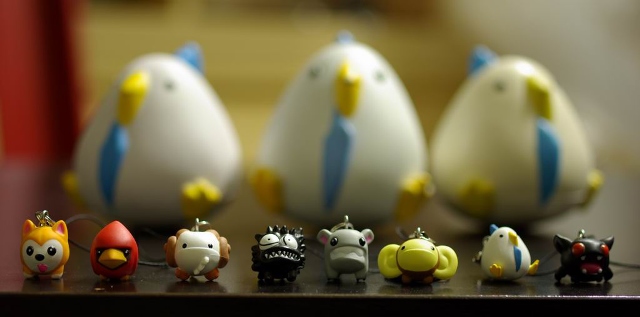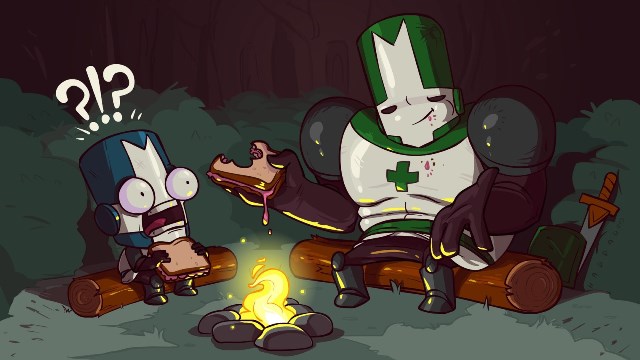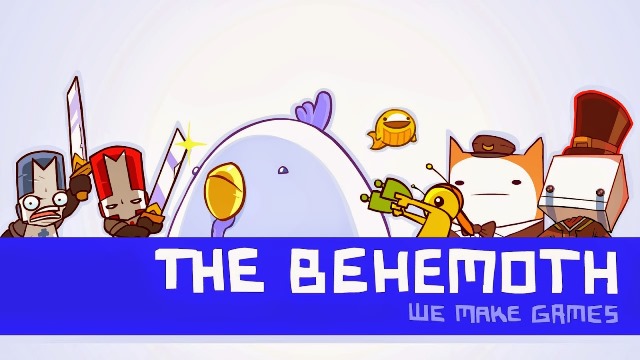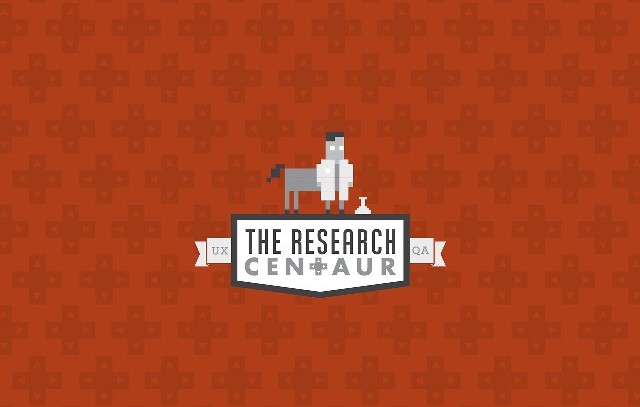John Baez doesn’t want Asteroid Base’s money. It’s as if the three men who make up the studio are old friends of Baez’s, and on this day they just happen to be patrons of his business. Their money is no good here.
They are not old friends, though. Baez, president and co-founder of indie game studio The Behemoth, only first met the members of Asteroid Base during PAX Prime of 2013. He noticed their still-in-production game Lovers in a Dangerous Spacetime had picked up a few awards and had a certain individuality to it. Lovers has a way of causing onlookers to gravitate towards it that’s not entirely unlike the way the game’s pink Death Star has a penchant for attracting the attention of enemy spaceships.
In the game, a pair of benevolent astronauts pilot a neon spacecraft around the universe, wishing only to survive. But then something catches their eyes, something they can’t ignore. A group of evil robots known as “The Haters” have ensnared innocent bunnies and locked them away in jail. The astronauts refuse to stand idly by while innocent creatures suffer, so they show some initiative, scrambling around the bowels of their craft and tinkering away at control stations that unleash firepower of a magnitude that they can only hope The Haters are unable to repel. Despite the protagonists’ violent response, Asteroid Base sees the titular lovers as good Samaritans. The pair have somehow survived this long on their own out in the frightening yet awe-inspiring uncertainty that is space, even managing to thrive in it without any support from large, external entities. Now they want to help other space-faring beings like them do the same.
The Behemoth knows the feeling. Founded in 2003, the San Diego studio responsible for such hits as Alien Hominid and Castle Crashers chose to go it alone in another dangerous environment. The developer released its games sans publisher in the competitive console gaming space. The Behemoth found success, but it wasn’t easy doing it through self-funding — Baez mortgaged his house, and co-founder Tom Fulp kicked in some of his personal savings to help finance development in the early days. But they did it, and they were successful enough that they’re now in a position of strength.
A few years ago, Baez and Company used that strength to quietly start something called The Gold Egg Project. Gold Egg is a funding initiative meant to help other indies bring their games to market, but unlike a traditional publisher, The Behemoth doesn’t take any of its beneficiaries’ profits — it only wants to help them. Now The Behemoth is helping Asteroid Base, and Baez hopes the studio will one day pass it on.
Being indie
For almost as long as there has been game design there have been independent game designers. The term “indie,” while well-established today, is newer. It means something; it’s just that no one seems to be able to agree upon exactly what that something is. So it was for The Behemoth back in 2005 when the tenderfoot studio’s Alien Hominid was winning Independent Game Festival Awards for Innovation in Art, Technical Excellence and Audience Choice.
Baez recalls of that time that “there was a lot of controversy [as to] whether we were indie or not, solely because we were on a console. Other developers said, ‘You can’t be indie because you’re on a console.’ And it’s like, ‘Well, we’re indie because we funded it.’ Now that’s our definition of indie.”
The Behemoth almost surely could have crossed over. It could have leveraged the uniqueness of its own games and their monetary successes to broker deals with publishing houses. Those deals could have funded future titles, and those titles could have begot even more deals for even more titles. But The Behemoth never wanted to walk that path, because doing so would have meant surrendering control or future profits or both. So it never gave in, never crossed over. It stayed indie.
Surrounded by what Baez perceives as a sea of scary options, the choice to self-fund wasn’t easy — The Behemoth’s founders didn’t take any salaries for a “long, long time” — but it’s apparent he feels it was the right choice to make, no matter how harrowing it was at times.
Speaking from his own experiences, Baez explains that “it is very difficult if you’re an independent developer to make that leap to creating a finished game and being able to do that without a publisher. And a publisher will make you many promises, right? And they will only tell you the good things about what they’re offering you, but it’s rare to find a publisher that will not want something — IP, royalties — to be the middleman. And really now with downloadable, you don’t need a publisher anymore. You just don’t need a publisher.”
Talented independent developers can now do it all on their own. With a proper vision and enough creativity and conviction, they can make whatever game they want to make. But many of them can’t do it entirely by themselves. Completing the development of a commercial video game and releasing that game still takes money. For a fortunate few, The Behemoth is here to take that headache away — without taking much else.
Not being a publisher
While the Southern California developer does of course expect studios to repay the money they borrow from it, Baez says that’s about the only thing his team takes from partners. It doesn’t ask for IP rights. It doesn’t insist upon multi-game deals. It doesn’t request royalty payments. In fact, it doesn’t even want to have any development oversight. Why do this, then? Why fund the competition’s work? What’s in it for The Behemoth?
“Not much,” a smiling Baez says, throwing up his hands as if to indicate that he himself isn’t entirely certain of his own motivations. After a quick laugh and some inward reflection, he elaborates: “So part of the criteria — it’s not really part of the criteria, but something that is important — is to find devs that understand that the independent community can grow if we all help each other. So we’re hoping that if the Asteroid Base guys have a huge hit they’ll do something similar to what we’re doing, so that they can help fund somebody else that’s just three guys in a garage making a game, and then that game gets made.”
“Because if everybody’s working on diverse titles and diverse content then the whole ecosystem gets super rich. Maybe we get remembered for being one of the early people that did this, but other than that it’s not — we’re not in it for anything. We’re not making any money off of it. We’re not interested in the royalties. It’s more of just seeing games that really need to be made get made.”
Providing developers with the money they need to fund game development has historically been something a publisher does. Independent developers have their vision, and they go about creating it through art, sound, programming and gameplay. Publishers, meanwhile, handle aspects like financial backing, marketing, manufacturing and distribution. Publishers do these things in exchange for the aforementioned royalties and/or IP rights. Every publishing deal has its own complicated intricacies, but that’s generally how things work.
At least, that’s how they used to work. Today, indies have options: Kickstarter, self-publishing, angel investors — even funding from fellow developers. Becoming a veteran independent developer means having gone through the process of turning raw ideas into tangible products. They understand what challenges that entails. They’ve learned what works and what doesn’t. Now, some have realized that they have both the capital and the passion to help their fellows overcome the barriers to entry. Polytron and Double Fine are two such developers, both having announced their own versions of The Gold Egg Project earlier this year.
“Lots of indies have approached us and asked if we could help them out with publishing, so we knew there was value in what we have to offer,” Double Fine COO Justin Bailey told Game Informer this past March. “They all had a unique request, and that’s where we started to see there was a real need for the knowledge we’ve gained over the last 14 years on how to prototype, fund, develop, and publish our own games.”
While Bailey found himself inundated with requests for help, Polytron founder Phil Fish stated that he, like Baez, was inspired to start backing other studios as a way to give back to the indie community. After reflecting on his own experiences coming up through the indie dev ranks, Fish concluded that being indie is a lot easier when you have a friendly helping hand. Or several of them. “We only got to make Fez in the first place because of the help and support of a LOT of cool people. Time to give back a little, you know?”
Fish said at the time that he was open to helping with payment logistics, day-to-day operations and promotions. But he didn’t want anyone confusing Polytron Partners with a publishing house. As it says in the name, “It’s a partnership.”
And so it is with Baez and Gold Egg. When told that the project may sound like a publishing deal to the outsider and asked if his studio is now moonlighting as a publisher, he is emphatic in his response: “No, no, no, no.”
Publishers, he says, do things for a developer. The Behemoth tends not do things for developers — unless you count signing checks as “doing things.” The studio offers financial aid and will provide advice on tradeshow appearances, marketing, merchandising, etc., but Baez’s company won’t physically do any of those things for the developer. Nor will it force partners to do things a certain way just because of the funding it’s providing them. Baez wants to see them figure it all out on their own, albeit with a safety net in place.
“I mean, that’s how we’ve learned to do what we’ve done. No one told us how to do all this,” he says, motioning at the large PAX East booth we’re sitting in, one that’s overflowing with gamers buying merchandise and playing games on The Behemoth’s trademark custom arcade cabinets. “We did what we thought would be appropriate or what we wanted to create for ourselves.”
It seems to have worked out pretty well for them. In addition to selling a lot of software, The Behemoth is well-known for moving massive quantities of merchandise, and that merchandise is available to its ravenous fans today all because the studio’s founders wanted it for themselves. They weren’t sure if their early projects would ever get released, so they wanted to have little mementos of the time they spent working on those games to sit on their desks. Because the team enjoyed the freedom to do whatever it wanted, many desks around the world are now decorated with Castle Crasher figurines and statuettes.
Being a benefactor
Selling branded tchotchkes has helped to build up the studio’s war chest. Unloading some of that chest’s contents on random indie developers and telling them to spend it developing games however they see fit probably wouldn’t be a very wise business strategy.
The Behemoth isn’t doing that. It’s not accepting applications for The Gold Egg Project, and it likely never will (it wants to primarily remain a developer and therefore has limited resources to devote to Gold Egg). Baez and the rest of the studio brass have a system in place for selecting beneficiaries: they go for a walk. They stroll around game conventions and assess developers’ work. They do this to identify small but talented development teams that may need monetary aid to finish and release their games.
The first such game was Eyebrow Interactive’s Closure. Why did they have faith in Eyebrow? It helped that The Behemoth knew Eyebrow programmer Tyler Glaiel from his time at Newgrounds, a flash animation and game-hosting website that just so happened to be created by The Behemoth co-founder Tom Fulp.
The team knew that Glaiel was someone whom they could rely on before they ever saw Closure. Then they saw it. “And the gameplay was unique, and that was kind of the — those are some of the important things that we look for in a game,” Baez notes. “Is the developer real? Have they done stuff? Can they complete projects? Is the gameplay unique? Does it have a unique art style? Those are the kind of big things we look at.”
Eyebrow’s puzzle-platformer turned out to be the right choice to be the first recipient of Gold Egg funding. The game made it to completion and released on major digital platforms Steam and the PlayStation Network in 2012. It currently enjoys a score of 81 on PSN and 78 on PC on popular review score aggregator site Metacritic, and, by Baez’s admission, it sold well on both platforms.
Furthermore, there weren’t any notable bumps along the way during the partnership, a fact that Baez attributes to his studio taking a hands-off approach. “All [Gold Egg] is is funding.” It’s funding that Eyebrow eventually had to pay back, but the repayment structure is described as being “very loose.” Checks are cut to the recipient developer, and the amounts are paid back “when they get the money.”
The Behemoth did, however, play one other role in Closure‘s creation: it had a small team make sure the game worked. The staff of its newly established testing facility (The Research Centaur) put Closure through its paces near release time, but that was the first opportunity they got to see the game in its entirety. Prior to then they only periodically checked in with Eyebrow to ask how things were going, purportedly being satisfied when told that they were going well. Eyebrow handled the actual development work; The Behemoth just told the diminutive studio what worked and what didn’t work, and then it sent Eyebrow out into the wild with its game. Reaching out to platform holders Valve and Sony and brokering deals with them was on Eyebrow, which allowed the money men to avoid the “publisher” label. Instead, they stayed in the background, content to silently fund the game.
Though the partnership was a success for both parties, it would be a couple years until The Behemoth found something else fitting its funding criteria. And that something involved space bunnies.
Being a beneficiary
“We’re not really very interested in Generic 3D Shooter Number 5,032, you know?” Baez asks rhetorically. “It just does not do anything for us. But if somebody’s come up with an interesting game mechanic, and they know how to flesh that out into a full game, and that game looks good at first blush then it’s totally something that we’d be interested in. And all those were lining up for [Lovers in a Dangerous Spacetime].”
Asteroid Base co-founder Jamie Tucker is happy about them lining up. When he first came in contact with The Behemoth, Baez’s team said they wanted to help Asteroid Base with mentorship through The Research Centaur’s services. Later, they asked the big question: did Asteroid Base want some money to fund the development of Lovers? It very much wanted that — but Asteroid Base also wanted the guidance that was first pitched.
“They offered that, and then they’ve sort of been an ear for us,” says Tucker. “What we really need the most is someone with that much experience being able to guide us with not making stupid decisions. There are a lot of stupid decisions we could make.”
The Behemoth is happy to help them steer clear of bad choices. After all, it wants to ensure the game it’s funding will one day be available for purchase — it’s currently planned for a TBA release date on Xbox One and Steam — and find enough success to replenish the coffers and keep the indie funding cycle going. But the arrangement isn’t right for everyone.
Baez elucidates: “You know, not everybody needs money or wants to take money. A lot of people are just a ‘I really want to do this on my own’ kind of thing. ‘I think I can do it on my own.’ Maybe they’ve created a great game, a great-looking game, but they just want to tough it out, and that’s totally awesome.”
How could it not be? That’s exactly how The Behemoth itself has done things. But not everyone has a house they can afford to mortgage or profits from a popular flash game website they can throw into the mix. Initially lacking development funding, Asteroid Base turned to publishers, banks and even the Canadian government for solutions. “But it was always just like one thing or a few things that was just really bad about [those options],” recalls Tucker. The studio had no money for development, and when there’s no money for development, there’s also precious little of an even more indispensable resource: time.
“It would be way far behind,” says Tucker of where Lovers in a Dangerous Spacetime would be without Gold Egg funding. “The major thing we got out of it is that we were able to work full time. We were only working part time, we were all working contract gigs. And so we kept getting pushed further behind and further behind and further behind on what needed to be done. Everything just starts piling up.”
That’s no longer the case, and now that it’s able to get down to business, Asteroid Base has the time to achieve what it envisions of its debut effort. For instance, Lovers was always planned for a console release in addition to PC, but Tucker admits that it may not have always been the most realistic plan. That was before the good Samaritans at The Behemoth went out for a walk through the halls of PAX Prime, before they saw a loving couple trying to free space bunnies from The Haters. The members of Asteroid Base were stuck in a different form of prison, one of overwhelming contract work. John Baez’s company posted their bail bonds, and now Asteroid Base is free to do things its own way.
He just hopes that some day they’ll pass it on to the next group of space bunnies.








